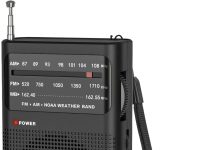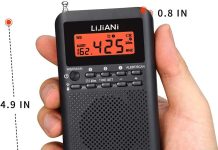Hey there! Have you ever wondered how often weather radios need their batteries changed? Well, today we’re going to tackle this question and provide you with some useful insights. Weather radios are an invaluable tool for staying informed about severe weather conditions, but ensuring they have a steady power source is equally important. So, let’s dive right in and discover the answer to this battery-changing conundrum!
Review contents
Weather Radios and Battery Lifespan
Introduction to weather radios
Weather radios are an essential tool in keeping you informed and safe during severe weather events. These radios are specifically designed to receive alerts and updates from the National Oceanic and Atmospheric Administration (NOAA) and provide warnings about any potential hazards in your area. However, to ensure that your weather radio is always ready to provide vital information, it is crucial to understand the importance of batteries and their lifespan in these devices.
Importance of batteries in weather radios
Batteries play a crucial role in weather radios as they power the device and keep it running during crucial times. In the event of a power outage or when you are on the move, relying solely on AC power is not an option. This is where the batteries step in, ensuring that your weather radio remains operational, constantly monitoring the NOAA signals and delivering life-saving information. Without sufficient battery power, your weather radio becomes ineffective, defeating its purpose of keeping you safe and informed.
Factors affecting battery lifespan
The lifespan of batteries in weather radios depends on various factors. Understanding these factors can help you maximize the battery life and minimize the frequency of battery changes. Some key factors that influence battery lifespan include the type of batteries used, average battery life for different battery types, and external factors that affect battery life.
Determining Battery Life
Types of batteries used in weather radios
Weather radios generally use two types of batteries: disposable batteries and rechargeable batteries. Disposable batteries, such as alkaline or lithium, are commonly used due to their availability and convenience. On the other hand, rechargeable batteries, such as nickel-metal hydride (NiMH) or lithium-ion (Li-ion), are also used as they offer a more eco-friendly and cost-effective alternative.
Average battery life for different battery types
The average battery life for weather radios can vary depending on the type of batteries used. Disposable batteries typically last between 100 to 200 hours, while rechargeable batteries can last between 8 to 50 hours, depending on the capacity and quality of the battery.
Factors affecting battery life
Several factors can affect the overall battery life in weather radios. The frequency of use, volume settings, and the number of alerts received can significantly impact the battery life. Higher usage, increased volume levels, and frequent alerts can drain the batteries faster, requiring more frequent battery changes.
Frequency of Battery Changes
Manufacturer’s recommendations
Manufacturers of weather radios often provide recommendations on how often to change the batteries. These recommendations are based on factors such as the average battery life and the anticipated usage patterns. It is essential to follow these guidelines to ensure that your weather radio is always ready to alert you when severe weather strikes.
Usage patterns and battery consumption
Your usage patterns can greatly affect how often you need to change the batteries in your weather radio. If you frequently use your weather radio or live in an area prone to severe weather, you may need to change the batteries more often. Additionally, keeping the volume at high levels or using additional features like backlighting can consume more battery power, requiring more frequent battery changes.
Signs that the battery needs changing
Sometimes, it may be difficult to determine if the batteries in your weather radio need changing. However, there are a few signs that indicate it’s time for a battery replacement. If your weather radio starts to have difficulty powering on, experiences frequent signal interruptions, or the audio quality deteriorates, it may be a sign that the batteries are running low. It is always better to be proactive and replace the batteries as soon as you notice these signs to ensure uninterrupted performance.
Factors Influencing Battery Lifespan
Impact of weather conditions
Weather conditions can significantly impact the lifespan of batteries in weather radios. Extreme temperatures, whether hot or cold, can shorten battery life. High temperatures can cause the battery to discharge faster, while cold temperatures can reduce the overall battery capacity. It is crucial to store and operate your weather radio within the recommended temperature range specified by the manufacturer to maximize the battery lifespan.
Quality of batteries
The quality of batteries used also plays a vital role in determining their lifespan in weather radios. Opting for reputable battery brands that are known for their reliability and longer-lasting power can help ensure that your weather radio remains operational when you need it the most. While these batteries may be slightly more expensive, they often offer better performance and longer-lasting power, making them a worthwhile investment.
Proper storage and maintenance
Proper storage and maintenance can significantly impact the lifespan of batteries in weather radios. Storing your weather radio in a cool and dry place when not in use can prevent the batteries from deteriorating. Additionally, regularly cleaning the battery contacts and ensuring a secure connection during battery installation can also help optimize battery performance and prolong their lifespan.
Maximizing Battery Life
Choosing the right weather radio
Choosing the right weather radio can have a significant impact on battery life. Look for models that have energy-efficient features, such as automatic power-off when not in use, adjustable backlighting, or the ability to dim the display. These features can help conserve battery power and extend the overall battery life.
Using energy-efficient features
Utilizing energy-efficient features on your weather radio can contribute to maximizing battery life. Adjusting the volume to an appropriate level, turning off unnecessary features when not required, and reducing the backlight brightness can help conserve battery power. Remember, every small adjustment you make can have a substantial impact on battery life, so find the balance between functionality and conserving energy.
Follow proper battery installation
Proper battery installation is essential to ensure optimal performance and maximize battery life in weather radios. Always follow the manufacturer’s instructions when inserting and replacing batteries, ensuring that they are inserted in the correct orientation. A loose connection or incorrect battery installation can lead to poor contact and reduced battery efficiency.
Battery Replacement Guidelines
Inspect batteries periodically
Regularly inspecting the batteries in your weather radio is important to identify any signs of degradation or corrosion. Check for any leakage, unusual appearances, or signs of wear and tear. If any issues are detected, it is important to replace the batteries promptly to prevent any potential damage to your weather radio.
Keep spare batteries on hand
To avoid unexpected situations where you find yourself without functioning batteries, it is wise to keep spares readily available. Having spare batteries on hand ensures that you can quickly replace depleted batteries and keep your weather radio operational at all times. Remember to rotate the batteries periodically to ensure that you always have fresh replacements available.
Recycling and disposing of batteries safely
When it comes time to replace the batteries, it is crucial to dispose of them responsibly. Batteries contain hazardous materials that can harm the environment if not disposed of properly. Many local recycling facilities accept household batteries, including those used in weather radios. Contact your local recycling center to inquire about their battery recycling program. By recycling your batteries, you not only protect the environment but also contribute to the responsible management of hazardous materials.
Weather Radio Models and Battery Changes
Specific weather radio models and their battery requirements
Different weather radio models have varying battery requirements. Some models may require fewer batteries or have longer battery life, while others may have specific battery types they are compatible with. It is essential to review the specifications and requirements of your specific weather radio model to determine the most suitable batteries and the frequency of battery changes.
Comparison of battery change frequency
Due to differences in battery capacity and weather radio designs, the frequency of battery changes can vary among different models. While some models may require battery changes every few weeks, others may last several months before needing replacement. Understanding the battery change frequency of your weather radio model allows you to plan accordingly and ensure that you always have a reliable power source available.
Battery Brands and Performance
Reputable battery brands for weather radios
Choosing reputable battery brands for your weather radio is essential to ensure reliable performance and extended battery life. Some well-known battery brands, such as Duracell, Energizer, and Panasonic, are often recommended for their quality and reliability. These brands are known for their consistent power output and longer lifespan, making them ideal choices for powering your weather radio.
Performance and reliability of different battery brands
The performance and reliability of battery brands can vary, even among reputable ones. It is important to do some research and read reviews to determine which brands perform best in weather radios. Factors such as power output, shelf life, and general user satisfaction should be considered when choosing the most suitable battery brand for your weather radio.
Effectiveness of Weather Radio Alarms
Testing the effectiveness of weather radio alarms
The effectiveness of weather radio alarms is of utmost importance to ensure that you receive timely alerts and warnings. Regularly test the alarm function of your weather radio to confirm that it is working correctly. During the test, listen for clear and audible alerts and ensure that the alarm sound can be heard from a reasonable distance. If you experience any issues with the alarm reliability, it is essential to replace the batteries immediately to prevent any potential failures during critical weather events.
Impact of low battery on alarm reliability
Low battery levels can significantly affect the reliability of weather radio alarms. As the batteries deplete, the alarm sound may become faint or distorted, making it difficult to hear or recognize the alerts. It is crucial to replace the batteries as soon as possible to ensure that the alarm remains loud and clear, guaranteeing you receive critical weather updates when you need them the most.
Conclusion
Importance of regular battery checks
Regularly checking the batteries in your weather radio is vital to ensure that it remains operational and ready to provide crucial information during severe weather events. By staying proactive and replacing the batteries when needed, you can ensure that your weather radio remains reliable and functional.
Key considerations for battery replacement
When replacing the batteries in your weather radio, consider the manufacturer’s recommendations, your usage patterns, and the impact of external factors. Always choose reputable battery brands and follow proper battery installation procedures. By maximizing battery life and adhering to responsible disposal practices, you can ensure that your weather radio remains a reliable and essential tool in keeping you safe during severe weather events.




























